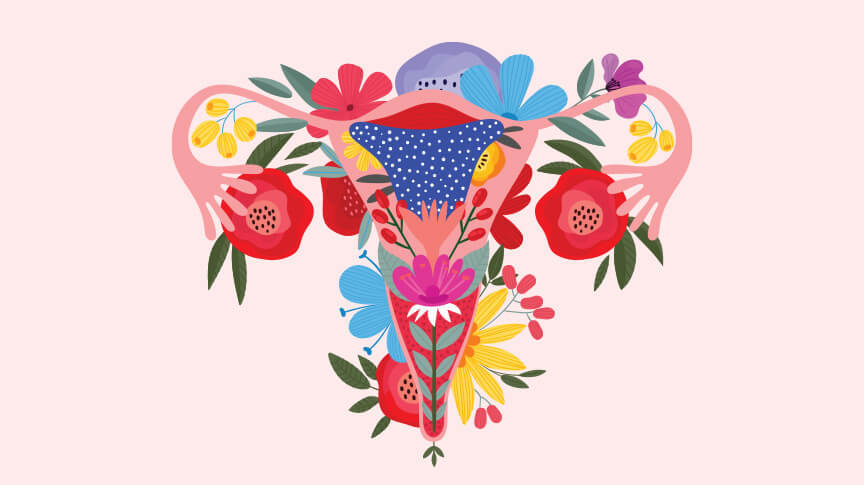Sex Cycles: Pleasure Throughout The Month

“Sex drive” is such a nuanced term. Especially for women and people who menstruate. Our bodies and hormone levels are constantly changing. This fluctuation can have a huge influence on our sex lives.
So why is that certain days we’re jumping at the chance to get in the sheets, and others we want to forget we even have a body?
Here we break down how the different phases of the menstrual cycle work, and why you may be more inclined to “get it on” during certain days than others.
Let it be noted, that these cycles reflect someone who is in their reproductive years, and is not on hormonal birth control.
An Orgasm a Day…
Believe it or not, the first stage of the menstrual cycle is menstruation. This is one we’re all too familiar with. When an egg isn’t fertilized, there is a drop in estrogen and progesterone, and the thickened lining of the uterus sheds through the vagina, aka your period.
Some women feel even more turned on during their period, especially towards the end of their cycle when rising estrogen levels balance serotonin, and their vulva is feeling engorged and tender thanks to increased blood flow.
Cramps got you down? A wise birdie once said that an orgasm (or more) a day, keeps the cramps away! The increased blood flow to the uterus during an orgasm can help alleviate cramps, that combined with a rush of oxytocin and dopamine, will have you feeling better in no time.
If period sex feels a little intimidating, check out our hot tips on surfing the crimson tide. Let this serve as a reminder that you don’t have to have penetrative sex to get your fix. There are plenty of ways to reap the benefits of period sex, without P in V action- or whatever your object of choice is.
Here Comes Estrogen!
Overlapping with your menstrual phase from the first day of your period to ovulation is the follicular phase. The ovary releases follicles filled with eggs, of which typically only one will mature. This mature egg tells the uterus to thicken its lining by rushing it with a surge of estrogen and testosterone.
As the body gears up for ovulation, this rise in testosterone may have you feeling like a teenage boy who just discovered his hand. Your endometrium thickens to make a cozy nest for a potential embryo.
Keep in mind that the strongest of sperm can survive up to five days in the female reproductive tract, so if you’re not looking for a baby, you may want to consider some sort of contraception, or whatever your method of choice is.
This Egg Means Business
Day 14: Ok we now have at least one mature egg that is released by the ovary and makes the journey through the fallopian tubes into the uterus, waiting for its moment to be inseminated. This egg means business, it wants to be fertilized, and in its efforts to fulfill its destiny in this short 24 hour window will stop at nothing to ramp up your libido.
Estrogen and testosterone levels start to drop until three or four days after ovulation, while progesterone continues to rise. Progesterone can cause some people to feel a bit down in the dumps, causing a sort of pre-PMS, all while causing your libido to drop.
Your Old Friend PMS
Let’s say this egg doesn’t get fertilized (they usually don’t), now we’re onto the luteal phase. Your luteal phase lasts from the end of ovulation to the start of your period, and anywhere from 11 to 17 days. Most of us know this one as good old PMS.
As progesterone works its magic in the body, the lining of your uterus continues to get nice and cushy for a potential guest in the form of a fertilized egg. Think of it like a mattress topper for your womb. Progesterone levels decrease again the closer you get to your period, which means potential brain fog will subside.
You may find yourself strangely excited during this phase. Researchers suggest extra horniness right before your period is thanks to stimulated nerve endings as the body gets ready for menstruation.
Although PMS may make you want to crawl under your covers and never come out, crawling under there with someone else may help ease your symptoms. Cuddling, or getting frisky, means oxytocin. Oxytocin is produced through sex, and is a natural pain reliever. Meaning a session in the sack may just be the quick fix you’ve been looking for when it comes to cramps, irritability, or any other PMS symptoms you may be experiencing.
After this, we’re back to square one- menstruation.
While there are certain patterns to predict or explain when and why you might be feeling more frisky at certain points in your cycle- we’re all individuals. There are so many other factors that may affect your sex drive outside of where you’re at in your cycle. So follow your own internal rhythm and flow, allowing your body to show you when the right time is to have sex.

Natasha (she/her) is a full-spectrum doula and health+wellness copywriter. Her work focuses on deconstructing the shame, stigma, and barriers people carry around birth, sex, health, and beyond, to help people navigate through their lives with more education and empowerment. You can connect with Natasha on IG @natasha.s.weiss.


